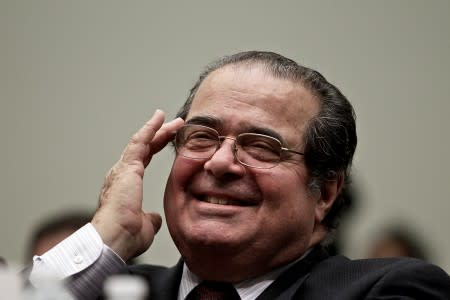Scalia: Inventing “new minorities” or protecting constitutional rights?
In this commentary, Katelynn McBride from the Institute for Justice argues that, counter to what Supreme Court Justice Antonin Scalia stated this week, judges who enforce the Constitution’s prohibition on arbitrary discrimination are properly fulfilling their judicial role.
U.S. Supreme Court Justice Antonin Scalia. Photo by Stephen Masker.
Speaking unfavorably of the Supreme Court’s recent decisions on gay marriage, Supreme Court Justice Antonin Scalia said on Monday: “It’s not up to the courts to invent new minorities that get special protections.”
What Justice Scalia means, of course, is that courts have virtually no role to play when democratic majorities discriminate against anyone who does not belong to a historical minority such as African-Americans. This is part of Justice Scalia’s wider philosophy that recognizes only those few limits on government power that are unambiguously spelled out in the Constitution.
Justice Scalia is correct that the Supreme Court doesn’t need to consecrate new minorities and assign them special rights.
But contrary to his “minimalist” judicial philosophy, the Supreme Court simply needs to protect the rights of all, including what he could call “new minorities,” from arbitrary government action.
After all, James Madison stated that one of the central functions of the Constitution is to protect the minority against the majority. (Note that James Madison did not say to “protect all minorities except for new ones.”)
It is the cardinal duty of the judiciary to protect rights when the elected branches violate the Constitution.
Never has the need for an engaged judiciary, which protects the rights of all individuals, been more pressing.
While laws like the Defense of Marriage Act are the headline grabbers, government at all levels routinely harms some groups or individuals for the benefit of others without any genuine public policy justification. Lately, the best illustration of this is the government’s favorite pastime: occupational licensing.
In the 1950s, only one in 20 U.S. workers needed the government’s permission to pursue their chosen occupation. Today, that figure stands at almost one in three, a disturbing trend that has only been permitted to occur because judges across the country accept the view that when courts enforce the Constitution and strike down arbitrary government action, they are somehow improperly giving “special protections” to “new minorities.”
Take hair braiders and eyebrow threaders: hair braiding involves the twisting, weaving, extending or locking of natural hair while eyebrow threading is a natural and safe method of hair removal that uses a single strand of cotton thread to remove unwanted hair, most commonly from the eyebrows.
Braiding and threading are both cultural trades hailing, respectively, from Africa and India, and that people learn how to do from family in their home countries.
Immigrant entrepreneurs come to this country wanting to make a living by practicing these cultural trades that most of them have been doing since they were children. Yet multiple states require both braiders and threaders to waste thousands of hours in school in order to get a cosmetology license when they learn nothing about how to braid hair and thread eyebrows in cosmetology school.
Yet under Justice Scalia’s view, judges cannot strike down arbitrary cosmetology licensing requirements without supposedly giving “special protections” to braiders and threaders. So it is the elected branches’ job to change the law.
The only problem is they don’t. Braiders and threaders have approached elected branches across the country explaining how illogical the licensing requirements are. But time and time again, cosmetologists drive from all over the state to testify in favor of keeping these irrational laws in place–and time and time again, the elected branches do just that.
With cosmetologists begging to keep licensure requirements in place and the elected branches abiding, the only way for these irrational license requirements to go away is for courts to strike them down. But courts accepting Justice Scalia’s view do the opposite and rubber-stamp irrational laws.
Case in point: the Tenth Circuit upheld the constitutionality of an Oklahoma law that only allowed licensed funeral directors to sell caskets, even after acknowledging that the law was “granting special benefits to an industry.”
In doing so, the Tenth Circuit represented the paradigm of what Justice Scalia thinks the proper judicial role should be— the Tenth Circuit refused to give the casket sellers, “special protections.”
But the Tenth Circuit’s ruling did have the effect of cementing the well-connected funeral directors with the “special protections” of legislation prohibiting anyone else from competing with them in casket sales.
Justice Scalia’s approach leads to judges abdicating their role of protecting constitutional rights when that role is needed the most.
When judges refuse to strike down irrational laws and wait for the elected branches to do something, it is not as though no group is getting “special protections” from the government. It is just the well-connected groups like cosmetologists and funeral directors that receive the special protections, and they receive those protections at the expense of those who just want to earn an honest living without arbitrary government interference.
Katelynn McBride is an attorney at the Institute for Justice, which wrote an amicus brief supporting the invalidation of DOMA and in September 2011 released “Government Unchecked: The False Problem of ‘Judicial Activism’ and the Need for Judicial Engagement.”
Recent Constitution Daily Stories
Zuckerberg’s “Internet as a human right” faces policy barriers


